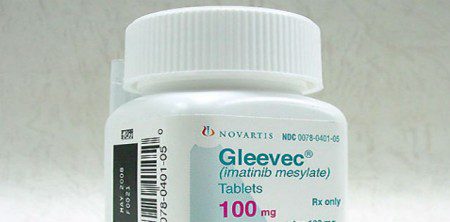 Gleevec (imatinib mesylate) is a type of drug called a tyrosine kinase inhibitor (TKI). TKI’s that inhibit KIT and/or PDGFRA are the main types of drugs used for GIST.
Gleevec (imatinib mesylate) is a type of drug called a tyrosine kinase inhibitor (TKI). TKI’s that inhibit KIT and/or PDGFRA are the main types of drugs used for GIST.
Targeted drug therapy is different from traditional chemotherapy in that it is very selective. Traditional chemotherapies kill all cells that are dividing rapidly. This is what causes so many side effects. In addition to the cancer cells, traditional chemotherapy also kills many of the body’s normal cells. Gleevec is much more selective and as a result has fewer SIDE EFFECTS.
Gleevec was filed for registration based on the striking results of Phase II clinical trials and received approval from the European Union (EU) (May 31, 2002), the Food and Drug Administration (FDA) in the United States (February 1, 2002), and other countries for the treatment of adult patients with c-Kit (CD117) – positive unresectable and/or metastatic malignant GISTs. On December 19th, 2008, Gleevec was also approved for adjuvant treatment for patients in the United States.
Gleevec is known by several different names:
- Gleevec in the U.S.
- Glivec elsewhere.
- Imatinib Mesylate.
- STI571 during clinical trials (STI stands for Signal Transduction Inhibitor).
Gleevec is a pill.
It is taken once or twice daily depending on dosage.
Gleevec is used in GIST for:
- To prevent recurrence using adjuvant therapy – Adjuvant Gleevec (also known as Preventative Gleevec)
- To treat metastatic disease
- To treat inoperable primary tumors
- In some cases, Gleevec is used to shrink a primary tumor in order to make surgery easier. This is called neoadjuvant therapy or Neoadjuvant Gleevec.
Other drugs can interact negatively with Gleevec and affect its efficacy:
Read about drug interactions with Gleevec.
